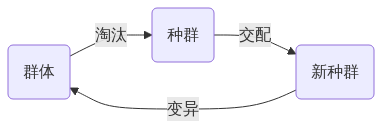621 words
3 minutes
遗传算法
遗传算法是智能优化算法、随机自适应的全局搜索算法。启发于进化论、遗传学说
生物进化过程
「群体」淘汰部分「个体」,选择剩下的个体作为「种群」
「种群」的个体交配产生「新种群」
「新种群」部分个体变异产生「群体」
算法与过程对应
群体 - 一组问题搜索空间
种群 - 选择后的新群体
染色体 - 问题有效解编码串
基因 - 问题解的一个编码单元
适应能力 - 染色体的适应值
交配 - 染色体交换部分基因得到新染色体
变异 - 染色体某些基因数值变化
进化结束 - 算法满足终止条件
算法过程:
- 随机生成一组个体
- 根据适应度评估个体
- 使用遗传操作进行演化:选择 交叉 变异
- 重新评价适应值,更新最优个体
应用(优化问题)
求解精度为小数点后两位
编码并设计适应度 F(x)
-1, 1 精度 2 位 -> 200 等分
-> 8 位二进制编码串 y 表示(染色体y)
-> x 与 y一一对应(个体x)
-> f(x) -> F(x)
round((upper- lower)10^t)<=2^L-1
二进制y -> x=lower+y*(upper-lower)/(2^L-1)
适应度函数:F(x)=1/(1+f(x))
算法过程
设种群规模 N=50,random 产生 50 个染色体,选最大的 F(x) 对应 y
选择:轮盘赌法选择最适应的个体进行繁殖
交叉:两个个体染色体交配
变异:随机改变个体基因
轮盘赌法:p(i) 为 i 被选择的概率 (F(x)归一化)
num_items = 8 # 染色体位数
pop_size = 50 # 种群数量
num_iter = 100 # 迭代次数
selection_rate = 0.5
mutation_rate = 0.01
def init_population():
population = []
for i in range(pop_size):
chromosome = []
# 初始化染色体
for j in range(num_items):
chromosome.append(random.randint(0,1))
# 加入种群
population.append(chromosome)
return population
def fitness(chromosome):
x = -1 + int(chromosome, 2) * 2/(2^8-1)
f = 4*x**3+3*x**2-6*x+1
return 1 / (1 + f)
def selection(population):
population_fitness = [fitness(chromosome) for chromosome in population]
# 根据适应度降序排序的population数组
sorted_population = [x for _,x in sorted(zip(population_fitness, population), reverse=True)]
# 返回前selection_rate占比的population
return sorted_population[:int(selection_rate * len(population))]
def crossover(parent1, parent2):
crossover_point = random.randint(0, num_items-1)
child1 = parent1[:crossover_point]+parent2[crossover_point:]
child2 = parent1[crossover_point:]+parent2[:crossover_point]
return child1, child2
def mutation(chromosome):
for i in range(num_items):
if random.random() < mutation_rate:
j = random.randint(0, num_items-1)
chromosome[i], chromosome[j] = chromosome[j], chromosome[i]
return chromosome
def gengtic_algorithm():
population = init_population()
for i in range(num_iter):
selected_population = selection(population)
offspring_population = []
for j in range(pop_size - len(selected_population)):
[parent1, parent2] = [ random.choice(selected_population) for _ in range(2)]
child1, child2 = crossover(parent1, parent2)
[child1, child2] = [mutation(item) for item in [child1, child2]]
offspring_population += [child1, child2]
population = selected_population + offspring_population
print("best: ", max(population, key=fitness), fitness(max(population, key=fitness)))
